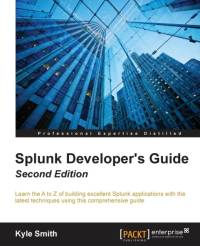Om Splunk Developer's Guide -
Learn the A to Z of building excellent Splunk applications with the latest techniques using this comprehensive guide About This Book - This is the most up-to-date book on Splunk 6.3 for developers - Get ahead of being just a Splunk user and start creating custom Splunk applications as per your needs - Your one-stop-solution to Splunk application development Who This Book Is For This book is for those who have some familiarity with Splunk and now want to learn how to develop an efficient Splunk application. Previous experience with Splunk, writing searches, and designing basic dashboards is expected. What You Will Learn - Implement a Modular Input and a custom D3 data visualization - Create a directory structure and set view permissions - Create a search view and a dashboard view using advanced XML modules - Enhance your application using eventtypes, tags, and macros - Package a Splunk application using best practices - Publish a Splunk application to the Splunk community In Detail Splunk provides a platform that allows you to search data stored on a machine, analyze it, and visualize the analyzed data to make informed decisions. The adoption of Splunk in enterprises is huge, and it has a wide range of customers right from Adobe to Dominos. Using the Splunk platform as a user is one thing, but customizing this platform and creating applications specific to your needs takes more than basic knowledge of the platform. This book will dive into developing Splunk applications that cater to your needs of making sense of data and will let you visualize this data with the help of stunning dashboards. This book includes everything on developing a full-fledged Splunk application right from designing to implementing to publishing. We will design the fundamentals to build a Splunk application and then move on to creating one. During the course of the book, we will cover application data, objects, permissions, and more. After this, we will show you how to enhance the application, including branding, workflows, and enriched data. Views, dashboards, and web frameworks are also covered. This book will showcase everything new in the latest version of Splunk including the latest data models, alert actions, XML forms, various dashboard enhancements, and visualization options (with D3). Finally, we take a look at the latest Splunk cloud applications, advanced integrations, and development as per the latest release. Style and approach This book is an easy-to-follow guide with lots of tips and tricks to help you master all the concepts necessary to develop and deploy your Splunk applications.
Visa mer

